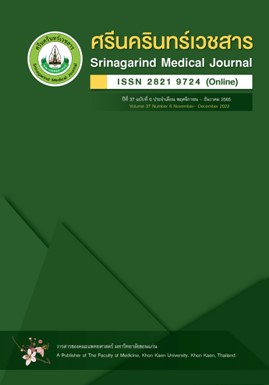บทบาทพยาบาลในการส่งเสริมความรอบรู้ด้านสุขภาพของผู้สูงอายุในสถานการณ์การแพร่ระบาดของโรคโควิด-19
คำสำคัญ:
บทบาทพยาบาล, การส่งเสริมความรอบรู้ด้านสุขภาพ, ผู้สูงอายุ, โรคโควิด-19บทคัดย่อ
โรคโควิด-19 (COVID- 19) เป็นโรคติดต่ออันตรายร้ายแรง ที่ส่งผลกระทบต่อระบบสุขภาพ เศรษฐกิจ และสังคมอย่างรุนแรงในหลายประเทศทั่วโลก จากสถานการณ์การแพร่ระบาดของโรคโควิด-19 ในปัจจุบัน พบว่ายังคงมีความรุนแรง มียอดผู้เสียชีวิตต่อวันเพิ่มสูงขึ้นอย่างต่อเนื่อง ซึ่งในกลุ่มของผู้เสียชีวิตส่วนใหญ่เป็นกลุ่มผู้สูงอายุ เนื่องจากผู้สูงอายุเป็นวัยที่มีระบบภูมิคุ้มกันเสื่อมถอยลง ทำให้เสี่ยงติดเชื้อโรคโควิด-19 ได้ง่าย และอาจมีอาการรุนแรงถึงขั้นเสียชีวิตได้ ปัจจุบันพบว่าผู้สูงอายุมีระดับความรอบรู้ด้านสุขภาพต่ำเมื่อเทียบกับประชากรในวัยอื่น ๆ โดยจากหลายการศึกษาพบว่า ถ้าผู้สูงอายุมีความรอบรู้ด้านสุขภาพที่เพียงพอ จะสามารถคงไว้ซึ่งการมีสุขภาพดีอยู่เสมอในยุคการระบาดของโรคโควิด-19 ส่งผลต่อการมีคุณภาพชีวิตทางด้านสุขภาพที่ดีขึ้น บทความนี้มีวัตถุประสงค์เพื่อทบทวนเนื้อหาเกี่ยวกับบทบาทพยาบาลในการส่งเสริมความรอบรู้ด้านสุขภาพของผู้สูงอายุในสถานการณ์การแพร่ระบาดของโรคโควิด-19
พยาบาลมีบทบาทสำคัญในการส่งเสริมความรอบรู้ด้านสุขภาพของผู้สูงอายุ ในสถานการณ์การแพร่ระบาดของโรคโควิด-19 ได้แก่ 1) ด้านการเข้าถึงข้อมูลสุขภาพ และบริการ (Access skill) 2) ด้านความรู้ความเข้าใจ (Cognitive skill) 3) ด้านทักษะการสื่อสาร (Communication skill) 4) ด้านทักษะการจัดการตนเอง (Self-management skill) 5) ด้านการรู้เท่าทันสื่อ (Media literacy skill) และ 6) ด้านทักษะการตัดสินใจ (Decision skill) เพื่อป้องกันการติดเชื้อโรคโควิด-19 ในผู้สูงอายุ
เอกสารอ้างอิง
Cavanaugh KL. Health literacy in diabetes care: explanation, evidence and
equipment. Diabetes Manag (Lond) 2011;1(2):191-9.
Nutbeam D. Health literacy as a public health goal: A challenge for contemporary
health education and communication strategies into the 21stcentury. Health Promotion International 2000;15(3):259-67.
World Health Organization. Health promotion glossary. Division of health promotion, education and communications, Health education and health promotion unit, WHO Geneva 1998;1-10.
The Board of directors for the preparation of the National health development plan, No. 12, Ministry of Public Health. National Health Development Plan, Vol. 12 (2017-2021); [Cited October 5, 2022]. Available from: http://dmsic.moph.go.th/index/detail/6991.
Mancuso JM. Health literacy: A concept/dimensional analysis. Nurs Health Sci 2008; 10(3):248-55.
Kaeodumkoeng K, Thummakul D. Health literacy promoting in aging population.
J Health Res 2015;9(2):1-8.
Department of Mental Health. Risk and Impact of COVID–19 to older adults. 2021; [Cited October 5, 2022]. Available from: https://www.dmh. go.th/news-dmh/view.asp?id=30794.
Yang P, Ou Y, Yang H, Pei X, Li J, Wang Y, et al. Research on influencing factors and dimensions of health literacy in different age groups: Before and after the COVID-19 era in Chongqing, China. Frontiers in Public Health 2021;9(Article 690525):1-11.
Worldometer. COVID-19 CORONAVIRUS PANDEMIC. 2022; [Cited October 5, 2022]. Available from: https://www.worldometers.info/coronavirus/.
Hofmann C, Wolf E. Older age groups and country-specific case fatality rates of COVID-19 in Europe, USA and Canada. Infection 2021;49(1):111-6.
The novel coronavirus pneumonia emergency response epidemiology team. Vital
surveillances: The epidemiological characteristics of an outbreak of 2019 novel coronavirus diseases (COVID-19) - China, 2020. China CDC Weekly 2020;2(8):113-22.
The situation administration center, ministry of interior. Covid-19 situation in Thailand. 2022; Retrieved from https://www.moicovid.com/.
Lebrasseur A, Fortin-Bédard N, Lettre J, Raymond E, Bussières EL, Lapierre N, et al. Impact of the COVID-19 pandemic on older adults: rapid review. JMIR AGING 2021;4(2):1- 17.
Watcharagupta Y, Jitsuchon S. Impact of covid-19 to the elderly. 2022; [Cited October 5, 2022]. Available from: https://tdri.or.th/2020/09/the-impact-of-covid-19-on-older-persons/.
The health education division, department of health service support, ministry of public health. 2017; [Cited October 5, 2022]. Available from: http://www.hed.go.th/linkHed/index/315.
The Commission to drive national reforms on public health and the environment. Health literacy reform and Health communication. 2016; [Cited October 5, 2022]. Available from: https://www.parliament.go.th/ewtadmin/ewt/parliament_parcy/ewt_dl_link.php?nid=38939.
The Institute for health systems research (HSRI). Health literacy. 2015; [Cited October 5, 2022]. Available from: https://www.hsri.or.th/researcher/media/news/detail/6263.
Department of health, ministry of public health. Health literate school: HLS. 2020; [Cited October 5, 2022]. Available from: http://hps.anamai.moph.go.th/files/HLS_Guideline.pdf
Osborne RH, Batterham RW, Elsworth GR, Hawkins M, Buchbinder R, The grounded psychometric development and initial validation of the health literacy questionnaire (HLQ). BMC Public Health 2013;13(1):1-17.
Ginggeaw S, Prasertsri N. The relationship between health literacy and health behaviors among older adults who have multi-morbidity. NJPH 2016;25(3):43-54.
Sriyasak A, Sarakshetrin A, Tongphet J, Ket-in V, Utaitum N, Supranee Mookui S, et al. Proposed policy for health management of older persons with diabetes and hypertension using health literacy in primary care cluster context: Case study in PCC, Phetchaburi province. 2020; [Cited October 5, 2022]. Available from: https://kb.hsri.or.th/dspace/handle/11228/5257.
Kareesun K, Malathum P, Sutti N. Relationships among health literacy, knowledge about hypertension control, and health behavior in older persons with hypertension. Rama Nurs J 2019;25(3):280-95.
Nutbeam D.The evolving concept of health literacy. Soc Sci Med 2008;67(12):2072-8.
Intarakamhang U. Knowledge of health. Measurement and development. Bangkok: Sukhumvit Printing Company Limited. 2017.
Darun P, Krairat T. Factors of health literacy influencing health behavior of people in Bueng Kan province. Department of Health Service Support Journal 2019;15(3):71- 82.
Ishikawa H, Takeuchi T, Yano E. Measuring functional, communicative, and critical health literacy among diabetic patients. Diabetes Care 2008;31(5):874-9.
Srithani K. The relationship between health quotient and quality of life of elderly people in the north-central region. HSRI 2017;11(1):26-36.
Lakhiao A, Chalikrua T. Health quotient and factors related to drug intake in hypertensive patients. Ban Piang Luang health promoting hospital Chiang Mai province.; The 6th National and International research conference and presentation in science and technology filed 2015;635-49.
Deechum W, Srisang P. Knowledge of health in self-care for good health among the elderly in Bangkok: A case study of enhancement of health knowledge of the elderly. Urban Med 2019;63(additional edition):74-82.
Boonsathien W, Rianthipayasakul O. Health literacy: situations and effects on health conditions of the elderly. J Nurs Sci Health 2020;2(1):1-19.
Cheysuwan W. Knowledge of health: concepts and applications to nursing practice. Royal Thai Navy Med J 2017;4(44):183-197.
Boonyaratkalin P. Community health nurses’ role in promoting health literacy among older adults. Thai Red Cross Nurs J 2020;13(1):63-75.
ดาวน์โหลด
เผยแพร่แล้ว
รูปแบบการอ้างอิง
ฉบับ
ประเภทบทความ
สัญญาอนุญาต
ลิขสิทธิ์ (c) 2022 ศรีนครินทร์เวชสาร

อนุญาตภายใต้เงื่อนไข Creative Commons Attribution-NonCommercial-NoDerivatives 4.0 International License.




